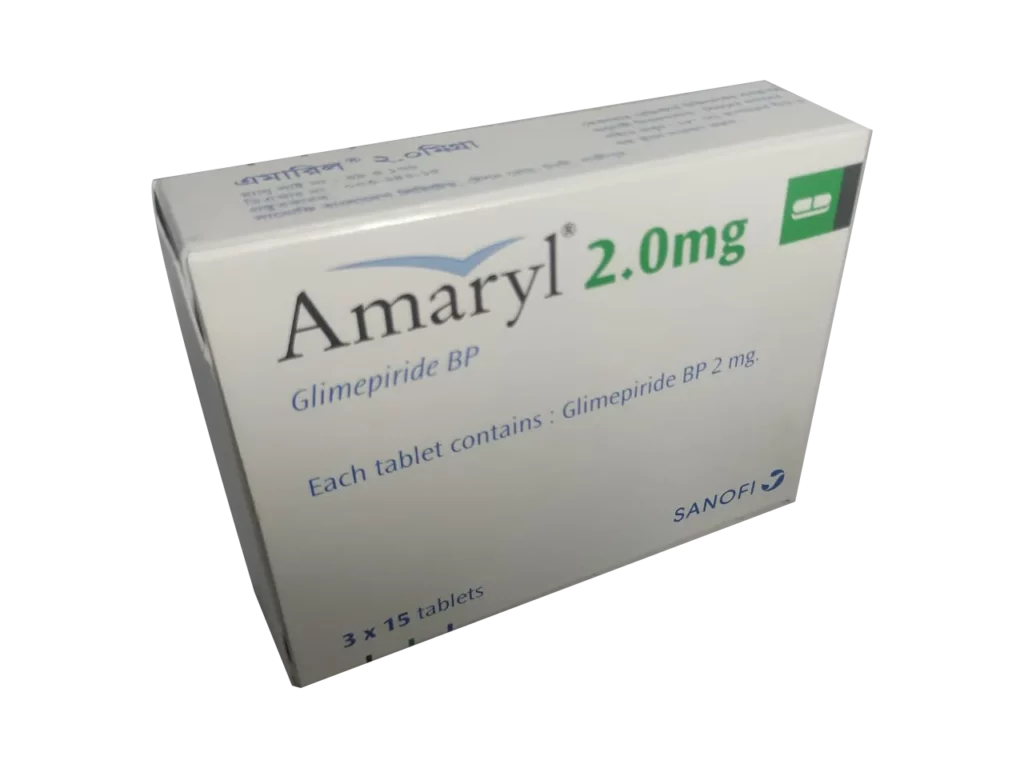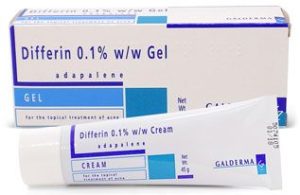Buy Amaryl

GENERAL INFORMATION
Mechanism of Action:
Amaryl, containing Glimepiride as its active ingredient, falls within the category of oral hypoglycemics. It operates by stimulating insulin secretion from the pancreas, thereby facilitating improved insulin utilization throughout the body.
Type of Diabetes Targeted:
Specifically designed for individuals diagnosed with type 2 diabetes, Amaryl plays a crucial role in managing blood sugar levels effectively.
Complementary Treatment Approach:
Amaryl is prescribed when lifestyle modifications (including diet, exercise, and weight reduction) alone are insufficient in controlling blood sugar levels adequately. It is commonly used in combination with other medications such as metformin or insulin, particularly when monotherapy proves inadequate.
Pancreatic Function Enhancement:
Amaryl enhances pancreatic function by increasing insulin release, which is essential for regulating glucose levels in the body. By improving insulin utilization, it provides support to individuals experiencing insulin inefficiency.
DIRECTIONS
Initial Dosage and Timing:
Commence treatment with a 1 mg dose once daily, ideally taken with breakfast or the first substantial meal of the day.
Gradual Dosage Escalation:
Upon reaching a 2 mg dose, subsequent increases should be incremental, not exceeding 1 mg each time.
Titration occurs over one to two-week intervals, ensuring a carefully managed adjustment process.
Maintenance Dosage Range:
For adults, the typical maintenance dose ranges from 1 mg to 4 mg once daily.
Optimal administration is aligned with breakfast or the initial main meal, synchronizing with the body’s metabolic rhythms.
Maximum Daily Dosage:
Exercise caution not to exceed a daily dose of 8 mg.
Strict adherence to prescribed limits is imperative to ensure both safety and efficacy.
These detailed directives offer a comprehensive grasp of Amaryl’s administration, catering to its target demographic while emphasizing precise dosage guidelines. As always, consult a healthcare provider for tailored advice.
PRECAUTIONS
Renal and Hepatic Conditions:
Before commencing Amaryl therapy, individuals with kidney or liver issues should seek prior consultation with a healthcare professional. This ensures the medication’s safety in such conditions, with special attention warranted for those with cirrhosis, a chronic liver ailment.
Adrenal Function Considerations:
Patients with adrenal insufficiency or adrenal fatigue should engage in a thorough discussion with their healthcare provider before initiating Amaryl therapy. Close monitoring of adrenal function is essential due to the medication’s potential impact in this regard.
Pituitary Gland Issues:
Individuals with pituitary gland problems should have a detailed conversation with their healthcare provider before starting Amaryl. Regular monitoring of hormone levels may be necessary for those with pituitary-related concerns.
Glucose 6-Phosphate Dehydrogenase (G6PD) Deficiency:
Disclosure of any history of G6PD deficiency to the healthcare provider is prudent before using Amaryl. Close observation may be required due to the medication’s effects in individuals with this deficiency.
Mineral Imbalance (Hyponatremia):
Patients with mineral imbalances, particularly hyponatremia, should inform their healthcare provider before initiating Amaryl therapy. Monitoring of electrolyte levels may be essential during treatment.
Allergies:
Any known allergies should be communicated to the healthcare provider to prevent adverse reactions to Amaryl or its constituents.
Side Effects Awareness:
Patients should remain vigilant for potential side effects such as blurred vision, dizziness, or drowsiness. During such episodes, avoiding activities requiring alertness, such as driving, is advised.
Alcohol Limitation:
Restricting alcohol intake is advisable while taking Amaryl to mitigate the heightened risk of hypoglycemia associated with alcohol consumption.
Stressful Situations:
During periods of increased stress, such as fever, infection, injury, or surgery, closer monitoring of blood sugar levels becomes imperative. Healthcare providers may need to adjust the treatment plan accordingly to maintain effective blood sugar control.
CONTRAINDICATIONS
Allergic Reactions:
Amaryl should not be administered in cases of known allergy to glimepiride or any of its components.
Pregnancy and Breastfeeding:
Amaryl is contraindicated in pregnant or breastfeeding individuals. Alternative treatment options should be explored under the guidance of a healthcare professional.
Type 1 Diabetes and Diabetic Ketoacidosis:
Amaryl is not suitable for individuals with type 1 diabetes (insulin-dependent diabetes) or those experiencing diabetic ketoacidosis. Alternative therapies should be sought for managing these specific conditions.
POSSIBLE SIDE EFFECTS
Immediate Medical Attention:
If you encounter any of the following severe side effects while using Amaryl, seek emergency medical assistance:
- Dizziness
- Headache
- Nausea
- Weakness
- Chest pain
- Difficulty breathing
- Hives
- Blood in the urine
- Dark tarry stools
- Easy bruising
- Nosebleeds
- Vomiting blood
- Swelling of the face or throat
- Loss of appetite
- Yellowing of the skin or eyes
- Persistent tiredness
- Blurred vision
- Dry mouth
- Shakiness
- Rapid heartbeat
Reporting Other Effects:
Notify your doctor about any additional side effects not mentioned above. It’s crucial to report any changes or discomfort experienced during the treatment process.
DRUG INTERACTIONS
Communication with Healthcare Provider:
It’s essential to inform your doctor about all medications you are currently using, including prescription, over-the-counter, and herbal remedies.
Specific Medications of Concern:
Be particularly cautious of potential interactions with the following classes of drugs:
- Beta blockers (atenolol, propranolol, labetalol)
- Antifungals (miconazole, fluconazole, ketoconazole)
- Decongestants (pseudoephedrine, phenylephrine)
- Seizure medications (fosphenytoin, phenytoin, carbamazepine)
- Chloramphenicol
- Clarithromycin
- Corticosteroids (cortisone, dexamethasone, prednisone)
- Disopyramide
- Diuretics (furosemide, amiloride, metolazone)
- Estrogens
- Fluoroquinolone antibiotics (ofloxacin, gatifloxacin, moxifloxacin)
- Monoamine oxidase inhibitors (isocarboxazid, selegiline, tranylcypromine)
- Fluoxetine
- Niacin
- Nonsteroidal anti-inflammatory drugs (ibuprofen, diclofenac, indomethacin, naproxen)
- Phenothiazine medications (chlorpromazine, trifluoperazine, promethazine)
- Oral contraceptives
- Rifampin
- Salicylates (aspirin, salsalate)
Understanding Drug Interactions:
The identification of potential drug interactions emphasizes the importance of careful monitoring and potential adjustments under the guidance of a healthcare professional. It may not always require discontinuation of one of the medications but underscores the need for vigilance.
MISSED DOSE
Prompt Action:
If you miss a dose of Amaryl, take it as soon as you remember.
Scheduled Dose Time:
However, if it is almost time for your next scheduled dose, skip the missed dose.
Avoiding Extra Dosage:
Do not take extra medicine to make up for the missed dose. Maintain consistency in your medication regimen by following the regular dosing schedule.
OVERDOSE
Emergency Medical Assistance:
In case of a suspected overdose, seek emergency medical help immediately.
Recognizing Overdose Symptoms:
Be vigilant for symptoms indicating an overdose, including:
- Sweating
- Shakiness
- Extreme hunger
- Dizziness
- Cold sweats
- Blurry vision
- Changes in behavior
- Loss of coordination
- Difficulty speaking
- Confusion
- Seizures
- Loss of consciousness
- Coma
Timely Intervention:
Swift medical attention is crucial to address potential complications associated with an overdose.
Avoiding Self-Management:
Do not attempt to manage an overdose situation on your own; always involve healthcare professionals for appropriate care and intervention.
STORAGE
Optimal Temperature Range:
Keep Amaryl at room temperature, ideally within the range of 59-77 degrees Fahrenheit (15-25 degrees Celsius).
Protection from Light and Moisture:
Shield the medication from direct light and moisture exposure, as these factors can compromise its potency.
Secure Container:
Store Amaryl in a tightly sealed container to safeguard it against environmental elements that may affect its stability.
Avoiding Bathroom Storage:
Do not store the medication in the bathroom, as fluctuating humidity and temperature levels can diminish its effectiveness.
Child and Pet Safety:
Ensure all medications, including Amaryl, are stored out of the reach of children and pets.
Store the medication in a location inaccessible to curious hands or animals to prevent accidental ingestion.



